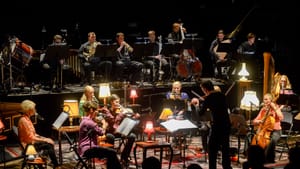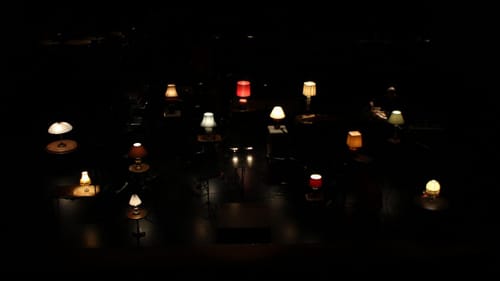Stay in the Loop
BSR publishes on a weekly schedule, with an email newsletter every Wednesday and Thursday morning. There’s no paywall, and subscribing is always free.
The dissonance of war
Philly Fringe 2018: Heiner Goebbels’s ‘Songs of Wars I Have Seen’

Heiner Goebbels’s well-traveled Songs of Wars I Have Seen, a chamber musicalization of Gertrude Stein’s wartime writing, arrives in Philadelphia as part of the 2018 Fringe Festival’s curated program. Although the 60-minute piece offers some interesting musical ideas and a few poignant theatrical moments, the dramaturgical whole is less than the sum of its parts.
The composition’s musical language blends period instrumentation and traditional orchestral forces with Goebbels’s own taste for jazz riffs and electronica. He quotes heavily from 17th-century composer Matthew Locke, layering excerpts from Locke’s adaptation of The Tempest over sonic booms and white noise. The aural dissonance succeeds in communicating the ravages of war — physical, mental, and spiritual.
Joining forces
Musicians for this local premiere have been recruited from the forces of the Philadelphia Orchestra and from Tempesta di Mare, the region’s leading Baroque ensemble. The players from both face the challenges of the score with great skill. Although little about Goebbels’s score is truly outré or avant-garde, at least by contemporary standards, the period instrumentalists adapt nicely to a style not entirely their own. The orchestra members — largely representing brass, percussion, and woodwinds — take pains not to overwhelm their Baroque colleagues. Anu Tali, who has conducted this work for more than a decade, clearly knows what she wants from her musicians.
Color, light, and darkness
Despite the musical strengths, Songs of Wars I Have Seen falters in its dramatic impulses. Goebbels certainly envisioned the piece as a hybrid of theater and music; the program even credits him with the evening’s lighting design. (Indeed, the FringeArts stage overflows with funky, old-fashioned lamps that occasionally plunge the players into total darkness). Perhaps to highlight Stein’s position as an American woman living in occupied France during World War II, he has the female orchestra members — all dressed vibrantly in colored shirts, a contrast to the usual regulation black — take turns speaking Stein’s texts.

The idea works in theory, and I respect these fine musicians for stepping outside their comfort zones. But it instantly becomes clear that they are not actors. Most of the group recite their speeches in a flat, affectless tone, with little regard for feeling or emotion. (Eve S. Miller, Tempesta di Mare’s cellist, is a notable exception). Several stumbled over words at the reviewed performance. This served only to highlight the artificial cleverness in some of Stein’s writing.
News flash: War is bad
Beyond the performative hiccups, Songs of War I Have Seen lacks theatrical momentum. The storytelling is raggedy and flat; Stein’s texts may offer individual portraits, but they don’t coalesce into a satisfying narrative whole. The work’s primary message — war is bad (duh?) — is simultaneously overstated and underdeveloped. Unlike Benjamin Britten’s War Requiem, which covers much of the same ground, you don’t get a sense of the words and music building together toward something greater or deeper than what’s on the surface.
But Goebbels, being a composer, can communicate his intentions just as well without words. The composition ends with the women in the ensemble (including Tali) striking temple bowls in unison as trumpeter David Bilger performs a mournful, wailing solo from the back of the stage. His muscular sound cuts through the quiet din created by his colleagues. Without a word, we once again experience the disorientation of war.
What, When, Where
Songs of Wars I Have Seen, by Heiner Goebbels. Featuring members of the Philadelphia Orchestra and Tempesta di Mare. September 7-8, 2018, at FringeArts, 140 N. Columbus Boulevard, Philadelphia. (215) 413-1318 or fringearts.com.
Sign up for our newsletter
All of the week's new articles, all in one place. Sign up for the free weekly BSR newsletters, and don't miss a conversation.

 Cameron Kelsall
Cameron Kelsall